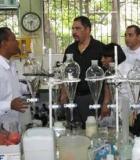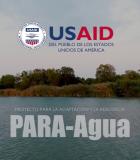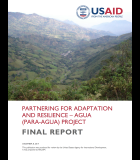Management of Aquatic Resources and Economic Alternatives (MAREA)
The USAID Regional Management of Aquatic Resources and Economic Alternatives (MAREA) program worked to gain acceptance of the ban by bringing together officials from environmental and fishing agencies of the Central American countries along with other relevant local institutions to address those concerns.
In Central America, more than 21 percent of the population resides in coastal communities, where at least 250,000 residents live in poverty and directly depend on lobster, shrimp, and fish harvests for their livelihood. The lure of the lobster-dive is economic: “These divers have been able to make $20 per day in a region where most fishermen earn $1 - $2 per day,” said Sergio Martinez, MAREA’s fisheries expert.
Another challenge is that soil erosion from farming and coastal development along the Central American coastline has degraded critical ecosystems, including coral reefs and seagrass that support the fish stock. More than 50 percent of the region’s mangrove forests have been lost by conversion to other uses like intensive agriculture and aquaculture, shrinking the habitat for maturing lobsters and fish. The loss of mangrove forests also leaves the coast vulnerable to flooding because they no longer block strong waves and winds that rush ashore, whittling away the shoreline during the stormy season. These pressures on the ocean and coastal habitats could put as many as 136,000 Central American fishermen out of work, according to a 2010 report from the Organization for the Fishing and Aquaculture Sector of Central America (OSPESCA) and the UN Food and Agriculture Organization (FAO).
Activity Description
To tackle these challenges, USAID’s strategy was to promote alternative livelihoods and to foster novel, more sustainable fishing practices. To help find employment for the many fishermen who stand to lose their jobs, USAID has secured financing agreements to support the equipment purchases needed to assist with the creation of new job opportunities. For example, the Program is working with the Central American Bank for Economic Integration to provide loans and outside donations to help offset the cost of upgrading village fishing boats with fiberglass to ready them to carry tourists. “The goal of this joint initiative is to create an opportunity for private and public investment in new, sustainable tourism activities that can employ out-of-work fishermen and divers,” said MAREA Chief of Party, Nestor J. Windevoxhel.
USAID also encouraged local fishermen and country-level natural resource managers to adopt a broader, ecosystem-based approach to marine coastal conservation. For the past year, MAREA has made significant strides educating local fishermen and regional leaders about rights-based mechanisms such as ‘catch-shares,’ which grant fishermen exclusive access to fish stocks in designated areas while making other vulnerable areas off-limits. Another way that USAID fostered best fisheries management is by requiring fishermen to use traps with a hatch that allows baby lobster to escape.




